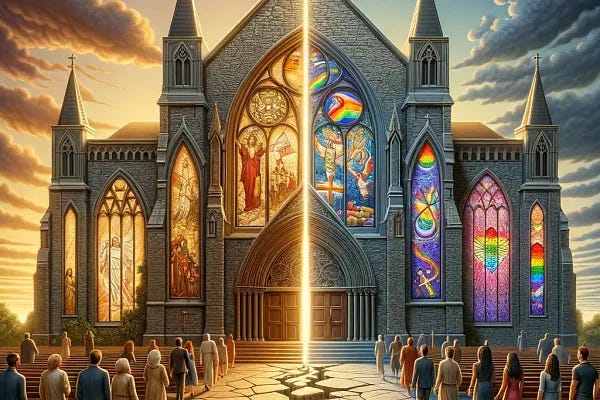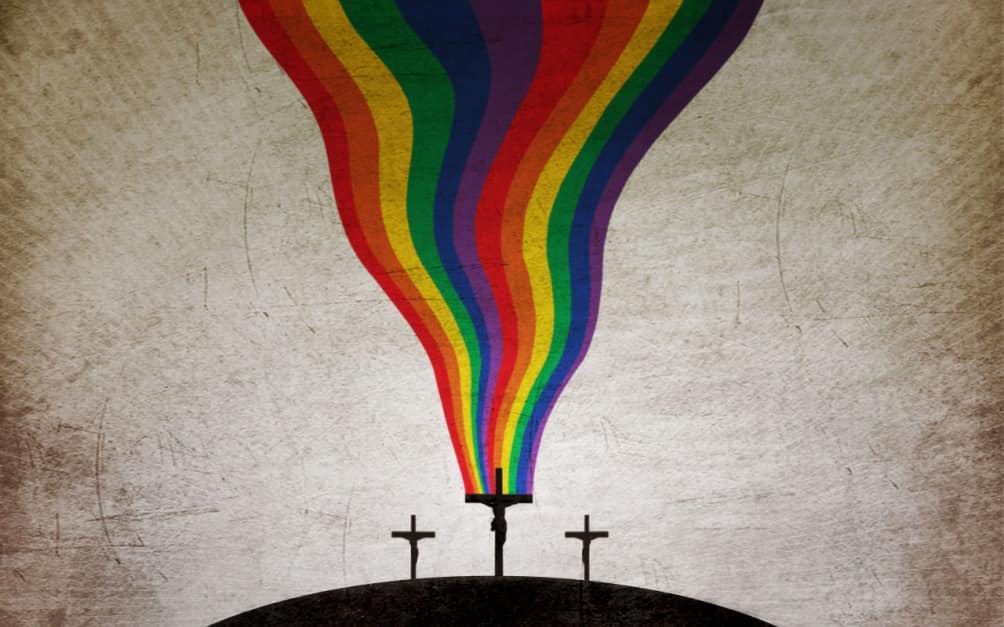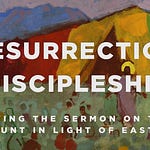Galatians 3:23-29
May 5, 2024
Saint Paul's letter to the church in Galatia is a letter that was written to a church that was at the breaking point because of division caused by false teachers of the gospel. When we hear "false teachers" today, we often think of slick-haired TV evangelists who peddle the modern equivalent of snake oil, preying on those who desperately need to hear the hope-filled Good News of God's amazing grace. The snake oil being sold was a return to the law, a return to righteousness (rightness with God) being dependent on following a list of rules that no single person can ever perfectly follow instead of relying on the faithfulness and righteousness of Christ. The return to a reliance upon the law led to division within the Galatian church.
According to Paul, the dividing lines that we insist on – race, class, sexual orientation, gender, politics – do not make sense in the light of the Good News of the grace of God. Those dividing lines are the powers of sin. This means our dividing leads to death because we know that sin gives us a one-way ticket to a life of darkness. This not only attempts to prevent others from experiencing the light of the resurrection but, at the same time, unbeknownst to us, prevents us from experiencing the same light.
A few Sundays ago, in our Sunday morning bible study, someone asked me if I was hopeful that The United Methodist General Conference would revise the denomination's position on LGBTQ+ persons. "Pastor Teer," the person asked, "Do you think the denomination will change? Are you hopeful the delegates will make The United Methodist Church as inclusive as Walker Chapel?"
I explained how I had been hopeful in 2012, 2016, and 2019 that the denomination would learn that whenever we say someone is "out," we have missed the great call Jesus gave to his disciples. "All authority in heaven and on earth has been given to me. Therefore go and make disciples of all nations, baptizing them in the name of the Father and of the Son and of the Holy Spirit, and teaching them to obey everything I have commanded you."[i]
Jesus said, “Go, make disciples, and teach them to obey everything I have commanded you.”
I told the group that, as a pastor, I am always hopeful. Hope is as much a part of this gig as angry emails about typos in the bulletin, hospital visits, living room conversations over lemon pound cake, and Fellowship Hall potlucks. I said, "Yes, I am hopeful. Hopeful that God will make some of the mess we have made of the Church, but as far as the General Conference goes, I am cautiously optimistic."
When someone is told they must do this or that to be included in the life of the church, that this or that is necessary for them to be accepted, the law has become our disciplinarian. Attempts to muddle the good news of the gospel with the law—glawspel—ignore that the law was temporary. The gospel is not another version of the law; Paul writes that it is the beginning of a new age.
Notice Paul's big "but" in verse 25.
What we are, who we are – individually and in the Church – are different from what we once were. Because of the cross of Christ and the light of the resurrection, because we are justified by faith alone, because of Paul's big but, what once was is no more.
Inclusivity in the Church, within Christ’s body, is only possible because Christ died for the ungodly. All of us are sinners who have fallen short of the glory of God. Paul’s but gets to the heart of the matter.
“But now,” writes Paul, “As many of you as were baptized into Christ have clothed yourselves with Christ. There is no longer Jew or Greek, there is no longer slave or free, there is no longer male and female; for all of you are one in Christ Jesus.”

The hope we cling to is that there are two sides to choose from because in Christ, the dividing lines, the lines of exclusion, are gone: being in Christ or under the power of sin—the side of hope or death.
If inclusion in the Church is the goal, then the starting point is not who is out but rather that all are included, not because of the law we prescribe to them. Instead, all means all because all of our sins, all of who we are, were taken by Christ to the cross, and now we are, as Paul writes, free.
It is sinful to say that someone is "incompatible" because of who God made them to be.
To those who have been told they and their families are “incompatible,” you have never been incompatible.
It is sinful to put barriers in place to prevent or discourage those called by God from responding to their call.
It is sinful to cherry-pick scripture to fit an agenda that is outside of God's grand plan for making all things new to push a political agenda within Christ's body.
Because of our proclivity to sin, the truth of the matter is that all of us are incompatible, which is why the cross and resurrection are not just moments in history but rather God’s cosmic reversal.
The result of God's grace, the result of the light of the resurrection of Jesus Christ, is that all of us are included in God’s renewing of creation. No matter how much we want there to be, no matter how high we build the barriers or creatively write the church doctrine, nothing can separate us from the grace of God, meaning all can only mean all when we see inclusivity through the cross of Christ and the light of the resurrection.
"Pastor Teer, do you have hope?"
There is no hope unless God has raised Jesus Christ from the dead. Without Easter, the empty grave, and Jesus's beachside breakfast with the disciples, we have no hope.
In her book, Advent: The Once and Future Coming of Christ, Rev. Fleming Rutledge wrote, "God's promises are trustworthy and that Christ will come again to restore all things."[ii] We cannot save ourselves or earn favor with God through doctrines of division and exclusion because, at the end of the day, we are a resurrection people. We believe that the light of the resurrection includes all people and all of creation.
Forgiveness, reconciliation, and supportive relationships within the body of Christ, recognizing that we have been clothed in the faithfulness of Jesus Christ and thus are needed in Christ's body, is only possible when we cling to the light, to the hope of the resurrection. The light of the resurrection enables us to turn away from the power of sin and toward the good news of the gospel.
What happened in Charlotte was not a new thing - but instead was the grip of the sin of exclusion losing its grip on Christ's body.
The removal of harmful language toward our LGBTQ+ siblings was not the church trying something new to be more relevant. Instead, what happened in Charlotte is the church inching one step closer to what the world looks like when the inclusivity of the light of Christ's resurrection outshines the divisions caused by our propensity to do harm to one another.
Jesus told his disciples, "As the Father has loved me, so I have loved you; abide in my love. If you keep my commandments, you will abide in my love, just as I have kept my Father's commandments and abide in his love… This is my commandment, that you love one another as I have loved you."[iii]
When we come to the table – as we eat the bread and drink from the cup – we publicly declare that all are welcome. The dividing lines are gone. Inclusivity is the only option because all are invited to taste and see God's goodness, mercy, and grace; because we "are one in Christ Jesus."[iv]
All that remains is to love one another. And loving one another as God loves us is our only hope.
[i] Matthew 28:18-20, NIV
[ii] Rutledge, Fleming. Advent: The Once and Future Coming of Jesus Christ. Page 175.
[iii] John 15:9-10, 12
[iv] Galatians 3:28

















Share this post